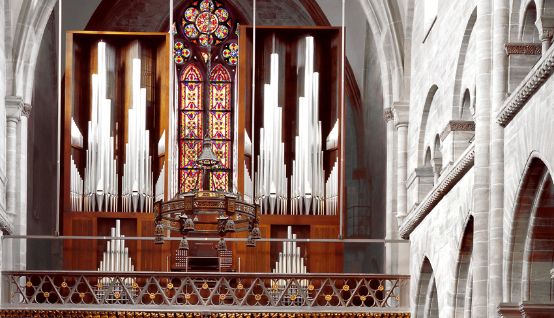First Basel organ walk
In mid-August, the tour organized by concert organists drew attention to the spiritual and artistic wealth of four churches.

The first Basel organ walk on August 15, 2015 brought together between 110 and 260 interested people in four churches in Basel's old town. It was organized by the KVOB association: This abbreviation stands for "Organists organizing concerts in Basel"who formed an association in 2013 to organize a two-week Basel Organ Festival in 2014. The Basel organ walk is not just an imitation of the Bernese or Zurich model, but an attempt to build on the great success of the organ festival on a smaller scale. Both forms of event - festival and walk - are to be held regularly in future.
The organ walk not only aims to allow visitors to experience Basel's diverse organ landscape, but also to draw attention to the spiritual and artistic wealth of the churches, thus offering a combination of architecture, art, music and city history. Art historian Helene Liebendörfer gave a competent and entertaining explanation of the history and significance of the four churches selected for the first edition of the walk.
Four fundamentally different and highly characteristic organs can be admired in the Predigerkirche, where the services of the Christkatholische Gemeinde and many events of the Schola Cantorum Basiliensis take place. Jörg-Andreas Bötticher, musical host and professor at the SCB, presented three of them: The Schwalbennest organ above the rood screen, the historic Italian organ, for which the participants walked into the choir room, so that a short organ walk already took place inside the church, and the Silbermann organ, reconstructed by the Metzler company in 1978, on which Bötticher improvised in the style of French classical music.
In addition to works by Johann Sebastian Bach, Max Reger and Charles-Marie Widor, cathedral organist Andreas Liebig also played two contemporary compositions on the four-manual Mathis organ in the cathedral: A meditative own chorale arrangement on a melody from Norway and - for the composer's 80th birthday - the Chaconne by Aulis Sallinen, a piece rich in contrast, in which the expanse of the late Romanesque or Gothic space was experienced in a particularly impressive way through concise gestures and extended general pauses.
In the afternoon, two former monastery churches were on the program, both of which have been considerably reduced in size over the course of their long history. Today, the Serbian Orthodox community celebrates its services in St. Alban's Church. The Metzler organ, built in 1966, is therefore rarely played in public, but is available to the Basel music school for teaching purposes. The instrument was overhauled this year by the Basel organ builder Michael Klahre, whereby the very direct sound character remained untouched at the request of the client. Nicoleta Paraschivescu played the well-known Toccata and Fugue BWV 565, the Vivaldi-inspired Voluntary in D minor op. 5/8 by John Stanley and the Symphonie Concertante by Guillaume Lasceux, a contemporary of the French Revolution.
Since 1994, the Basel Orphanage and Carthusian Church has been home to a faithful copy of an organ built exactly 300 years earlier by Arp Schnitger for the Hamburg Orphanage Church, which was later moved to Grasberg near Bremen. Works by Samuel Scheidt, Andreas Kneller, Peter Mohrhart, Matthias Weckmann and Dietrich Buxtehude, performed by Stefan Beltinger, were played here in true style and very colorful.
At the end of the organ walk, Tobias Lindner, President of the KVOB association, was right to point out that the event had been a great success and to thank the numerous participants, some of whom had traveled from Alsace, Baden and Bavaria, for their interest. Preparations are already underway for the second Basel Organ Walk, which will take place on August 13, 2016, once again on the last Saturday of the summer vacations. In addition, the KVOB association will once again be organizing a Basel Organ Festival in August and September 2016, with a thematic focus on the organ works of Max Reger (1873-1916), who had close ties to Basel.








